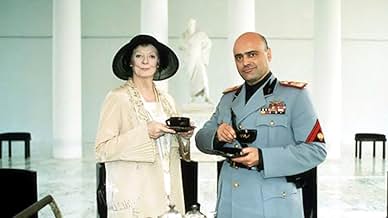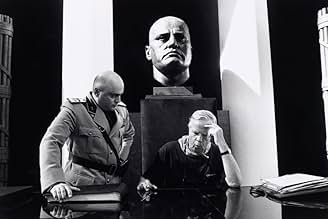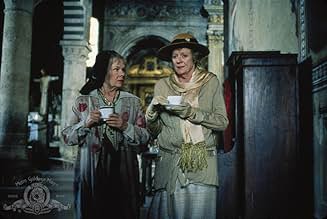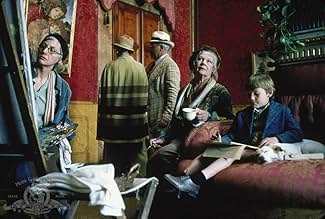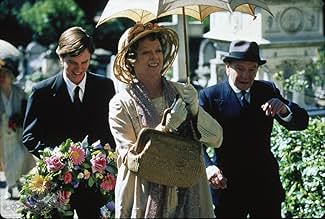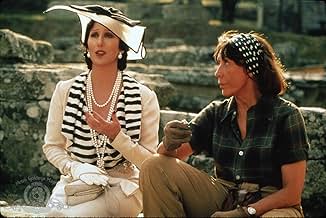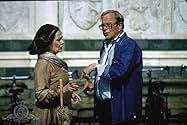IMDb RATING
6.9/10
15K
YOUR RATING
An orphaned Italian boy is raised amongst a circle of British and American women living in Mussolini's Italy before and during World War II.An orphaned Italian boy is raised amongst a circle of British and American women living in Mussolini's Italy before and during World War II.An orphaned Italian boy is raised amongst a circle of British and American women living in Mussolini's Italy before and during World War II.
- Won 1 BAFTA Award
- 5 wins & 3 nominations total
Featured reviews
I had wanted to see this film for some time and when the opportunity finally materialised I was enthralled. It is probably the best performance I have seen by Maggie Smith, who often seems to be playing the same character actually. But this is her best since Miss Jean Brodie, and Joan Plowright, Judi Dench, Lily Tomlin and Cher are all equally impressive.
The settings are skilfully designed to draw the viewer in, and when you are setting your movie in Florence and its environs you can't go wrong anyway. The ongoing clash between two worlds i.e. Lady Hester Random (Maggie Smith) versus Elsa (Cher) reaches a satisfying resolution which it would be unfair to reveal.
There are splendid comic vignettes mixed into the overall drama. Judi Dench and her dog being thrown out of the cathedral, sharply contrasts with the chilling moment when the Jewish arts professor is taken away by the Gestapo. Understated but none the less effective, probably more so, because of it.
If you haven't seen this film, see it as soon as you can.
The settings are skilfully designed to draw the viewer in, and when you are setting your movie in Florence and its environs you can't go wrong anyway. The ongoing clash between two worlds i.e. Lady Hester Random (Maggie Smith) versus Elsa (Cher) reaches a satisfying resolution which it would be unfair to reveal.
There are splendid comic vignettes mixed into the overall drama. Judi Dench and her dog being thrown out of the cathedral, sharply contrasts with the chilling moment when the Jewish arts professor is taken away by the Gestapo. Understated but none the less effective, probably more so, because of it.
If you haven't seen this film, see it as soon as you can.
This is a melodrama and you should not expect anything else. But what a melodrama! In the hands of a great director, using an eccentric story involving some eccentric people, it conveys straight to the heart how the great darkness descended upon Europe in the 1930's. It tells you that the greatest evil is the work of humans, and that the potential for evil lurks in the human soul. But, and here is the movie greatest strength, it shows you that humans possess the capacity to be human and to act human, when they heed Shakespeare's advice: "Love thyself last". All the negative comments that can be made about this or that deficiency caused me to downgrade this movie's rating from a "10" to a mere "9". Go see it. If you have kids - make sure to take them along for a great and satisfying lesson about life as it should be lived.
This film is directed and co-authored by Franco Zeffirelli, and I couldn't resist speculating on how much of it was actually true, since it is said to be based on Zeffirelli's autobiography. However, true in part, true completely, in the end it doesn't really matter. What matters is the amazing ensemble acting by Maggie Smith, Cher, Joan Plowwright, Judi Dench and Lily Tomlin (listing them in the order of significance to the story) and the stunning beauty of Florence where the film is set. The director and photographer plainly love the city, matching the love for it of the characters. Maggie Smith as the widow of a former British ambassador, the character that actually has tea with Mussolini, is the dominant figure in the film. However, Cher, playing a wealthy American -- vulgar in the eyes of he British ladies -- who turns out to be a complex, philanthropic Jew who must be smuggled out of the country in the end; Joan Plowwright as a kind lady who takes in the bastard son of an Italian businessman and teaches him to be an English gentleman; Judi Dench as an eccentric artist whose passion is to preserve a renaissance fresco from the Nazis during the war, and Lily Tomlin as a lesbian American archaeologist all deliver sterling performances. Cher's performance is the most amazing -- she holds her own in formidable company -- but one expects, of course, to be dazzled by Maggie Smith, Joan Plowwright, Judi Dench and even by Lily Tomlin. It's a sentimental, even melodramatic, tale, but see it for the ensemble acting. I can't think of another film that equals Tea with Mussolini in that respect.
This is a very European movie. Whereas Hollywood overstates, Europe understates. The story is based on the autobiography of Franco Zeffirelli, born in 1922, who became a prominent Italian stage director and achieved world fame as a director of filmed stage pieces such as "Romeo and Juliet," "Hamlet, and "La Traviata." The film deals with the years 1935-44. After the death of his mother Zeffirelli, or Luca in the film, an illegitimate child more or less rejected by his father, was looked after by a group of eccentric art-loving English ladies who had made Florence their home - on their terms. The locals call them the "Scorpioni" - a tribute to their acid tongues. When Mussolini declared war on Britain in 1940, the ladies were interned in a beautiful mountaintop village near Florence, guarded by a couple of long-suffering policeman, their lifestyle of sketching, painting, art appreciation and fine dining scarcely changing.
The setting is the Florentine treasure troves of Tuscan art, the Uffizi, Il Duomo and the Academy. The English are led by three grand dames of the theatre, Joan Plowright as Arabella, Luca's chief protector, Maggie Smith, and Judy Dench (with her real life husband Michael Williams in a supporting role as the British consul.). Then there are two equally larger than life Americans, a retired but still glamorous movie star played by Cher, and a bike-riding lesbian archaeologist played by Lily Tomlin. Most of the Italian characters are overshadowed by all this Anglo ego. (Or maybe it's just poor dubbing, or John Mortimer's part in the scriptwriting). The two boys playing Luca at different ages are good looking but the older one in particular is a bit vacuous, and Cher's impossibly handsome Italian boyfriend puts in a wooden performance.
There are a couple of plot-lines (will Cher escape the Jewish round-up, will the ladies make it through the war OK) and the occasional funny scene but the interest is really in the characters. Not that all of them are particularly attractive people. Maggie Smith's Lady Hester, widow of a former British Ambassador to Italy, is a dreadful old snob with hardly any brains who likes the fascists and has scarcely a good word for anybody else except her late husband. She engineers the tea party with Il Duce, fondly imagining that Mussolini himself will ensure the ladies' safety in Florence. A few days later the local fascists tip them out of the Uffizi gallery where they were accustomed to take tea while they sketched the old masters. Yet at the end she does show a little genuine good grace when she intervenes to help Cher.
It's a curious piece, reminiscent of "Life is Beautiful" - a light comedy with a deadly serious titanic struggle between good and evil going on in the background, a background which seems altogether too gorgeous to accommodate such evil. Good, represented by a Scottish major, triumphs in the end, only to be put in his place by the Scorpioni. Zeffirelli here pays his artistic and personal debt to them. Wacky though they were, the Scorpioni did know the difference between good and evil, or at least the difference between good art and bad art, and they taught Zeffirelli well.
The setting is the Florentine treasure troves of Tuscan art, the Uffizi, Il Duomo and the Academy. The English are led by three grand dames of the theatre, Joan Plowright as Arabella, Luca's chief protector, Maggie Smith, and Judy Dench (with her real life husband Michael Williams in a supporting role as the British consul.). Then there are two equally larger than life Americans, a retired but still glamorous movie star played by Cher, and a bike-riding lesbian archaeologist played by Lily Tomlin. Most of the Italian characters are overshadowed by all this Anglo ego. (Or maybe it's just poor dubbing, or John Mortimer's part in the scriptwriting). The two boys playing Luca at different ages are good looking but the older one in particular is a bit vacuous, and Cher's impossibly handsome Italian boyfriend puts in a wooden performance.
There are a couple of plot-lines (will Cher escape the Jewish round-up, will the ladies make it through the war OK) and the occasional funny scene but the interest is really in the characters. Not that all of them are particularly attractive people. Maggie Smith's Lady Hester, widow of a former British Ambassador to Italy, is a dreadful old snob with hardly any brains who likes the fascists and has scarcely a good word for anybody else except her late husband. She engineers the tea party with Il Duce, fondly imagining that Mussolini himself will ensure the ladies' safety in Florence. A few days later the local fascists tip them out of the Uffizi gallery where they were accustomed to take tea while they sketched the old masters. Yet at the end she does show a little genuine good grace when she intervenes to help Cher.
It's a curious piece, reminiscent of "Life is Beautiful" - a light comedy with a deadly serious titanic struggle between good and evil going on in the background, a background which seems altogether too gorgeous to accommodate such evil. Good, represented by a Scottish major, triumphs in the end, only to be put in his place by the Scorpioni. Zeffirelli here pays his artistic and personal debt to them. Wacky though they were, the Scorpioni did know the difference between good and evil, or at least the difference between good art and bad art, and they taught Zeffirelli well.
This film could have been titled 'four crazy grannies' for the marvelous portrayal of little old ladies, each more eccentric than the next. Like the comedy team of Matthau and Lemon, Dench, Smith and Plowright have a chemistry that is explosive.
Maggie Smith played a role that she has spent a lifetime perfecting. She captivates us as a snobbish dowager, tantalizes us with her improbable tea party and brings us to tears when she demonstrates her capacity to grow.
Although she may not have wowed us with her Shakespeare, Joan Plowright's compassion for her sudden charge made me wish (that at age 32) she would adopt me. Her love of the classics, remind us that art, literature and friends can help us transcend life's constant miseries.
Cher demonstrated that she could act in any time period. While Dame Judi Dench (not allowing herself to be typecast as a Queen) portrays a particularly pitiful creature as an aging artist with more passion than talent.
This film sends a clear message to Hollywood: experience and talent win out over T&A.
Applause at the end of this movie is to be expected.
Brava!
Maggie Smith played a role that she has spent a lifetime perfecting. She captivates us as a snobbish dowager, tantalizes us with her improbable tea party and brings us to tears when she demonstrates her capacity to grow.
Although she may not have wowed us with her Shakespeare, Joan Plowright's compassion for her sudden charge made me wish (that at age 32) she would adopt me. Her love of the classics, remind us that art, literature and friends can help us transcend life's constant miseries.
Cher demonstrated that she could act in any time period. While Dame Judi Dench (not allowing herself to be typecast as a Queen) portrays a particularly pitiful creature as an aging artist with more passion than talent.
This film sends a clear message to Hollywood: experience and talent win out over T&A.
Applause at the end of this movie is to be expected.
Brava!
Did you know
- TriviaCher has stated that the only reason she took the part of Elsa was because Writer and Director Franco Zeffirelli said he could only see her and no other actress in the role.
- GoofsThe tanks the Germans ride in are, in fact, U.S. Army M4 Shermans, not German-built Panzers.
- Quotes
Lady Hester: The Germans and the Italians couldn't get rid of us. There is absolutely no reason why we should surrender to the Scots.
- Alternate versionsThe MGM DVD, ISBN 0-7928-4300-2, is missing least one shot: The original tea with Mussolini scene ends with Mussolini forcing himself upon the reporter, forcing her onto his desk (i.e., he rapes her.) This DVD omits that ending and leaves the reporter's change in behavior unexplained.
- SoundtracksMattinata Fiorentina
Written by Giovanni D'Anzi (as D'Anzi) and Michele Galdieri (as Galdieri)
Performed by Alberto Rabagliati
- How long is Tea with Mussolini?Powered by Alexa
Details
- Release date
- Countries of origin
- Official site
- Languages
- Also known as
- Tea with Mussolini
- Filming locations
- Production companies
- See more company credits at IMDbPro
Box office
- Budget
- $12,000,000 (estimated)
- Gross US & Canada
- $14,401,563
- Opening weekend US & Canada
- $1,633,183
- May 16, 1999
- Gross worldwide
- $14,401,563
- Runtime1 hour 57 minutes
- Color
- Sound mix
- Aspect ratio
- 1.85 : 1
Contribute to this page
Suggest an edit or add missing content



